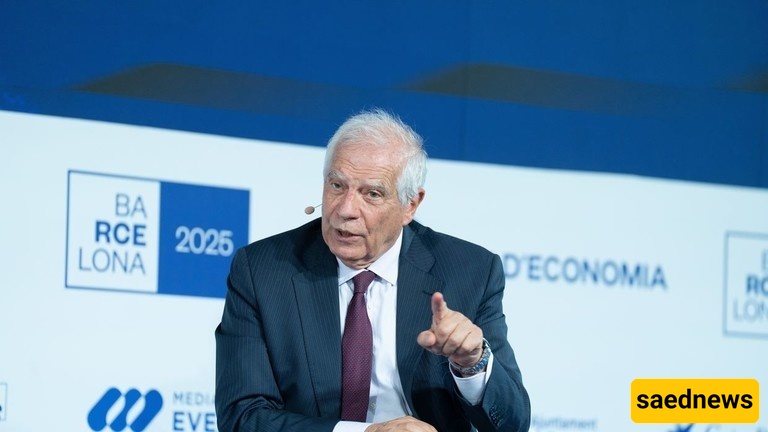SAEDNEWS: Josep Borrell, the European Union’s High Representative for Foreign Affairs, criticized Europe’s unprecedented inaction in the face of Israeli military operations, describing this passivity as “indirect complicity” in what he termed “war crimes.”

According to Saed News, citing Russia Today, in recent weeks, as Israeli military attacks on the Gaza Strip continue and the number of civilian casualties rises, international reactions to the global stance have intensified. Amid this, Josep Borrell, the EU’s senior diplomat, has openly criticized the silence and inaction of European Union member states, shedding new light on the EU’s ethical and political responsibilities regarding the Palestinian crisis.
This is not the first time the European Union has faced criticism for its mild or ambiguous positions on Israeli policies. However, what makes Borrell’s recent statements stand out is his clear stance from within the official EU framework; it is as if a cry is coming from the heart of Brussels bureaucracy.
A Silence That Resonates
In unprecedented remarks, Borrell said: “When we remain silent in the face of blatant violations of human rights and international laws or merely express concern, we in fact become indirect partners in those actions.” These comments, especially in a climate where many European countries avoid taking a clear stance against Israel, amount to an admission of a moral crisis in European foreign policy.
Analysts view these statements as a sign of a deep divide within the European Union regarding the Middle East crisis. While some countries like Ireland and Spain hold relatively more critical positions, others such as Germany, France, and the Netherlands, due to historical and geopolitical considerations, refrain from explicitly condemning Israel.
Political Responsibility or Legal Complicity?
The issue raised by Borrell is not merely political; it also has implications under international law. According to the Geneva Conventions, countries that are aware of actions such as war crimes but refrain from intervening or preventing them can be held accountable under the framework of “complicity in crime.”
In this context, some human rights organizations, including those based in Europe, have called on the European Union to halt arms and military equipment exports to Israel and to initiate independent investigations into the potential use of such equipment in attacks against civilians.
However, the question remains: why, despite these warnings, does the European Union continue to remain largely inactive? The answer lies in a complex intersection of economic interests, political lobbying pressures, and historical sensitivities.
The Decline of European Diplomacy
Borrell’s statements can also be interpreted as a sign of dissatisfaction with Europe’s diminished diplomatic influence on global issues. Whereas in past decades Europe was an active and balanced player in human rights matters, today this role has noticeably weakened. The inability to exert influence over regimes that violate human rights, including Israel, reflects a weakness in the EU’s foreign policy enforcement mechanisms.
This failure is costly for the European Union not only ethically but also geopolitically. While powers such as China, Russia, and even some Arab countries have adopted more independent stances, Europe remains trapped in a form of structural indecision.
Public Opinion: The Overlooked Factor
One of the often-overlooked dimensions in political analyses is the role of European public opinion. Various surveys indicate that a significant portion of European citizens oppose the unconditional support for Israel. In many countries, large-scale protests have been held in solidarity with the Palestinian people, yet these voices find little reflection in political decision-making.
The silence at the political leadership level stands in stark contrast to the voices of people in the streets. This disconnect has increasingly called into question the legitimacy of European decision-makers and has deepened the gap between political institutions and civil society.
Conclusion: Will the Silence End?
While Josep Borrell’s remarks may not, on their own, lead to a shift in Europe’s overarching policies, they serve as an important jolt to the Union’s political and moral conscience. In a world where truths can no longer remain hidden, silence is no longer a cost-free choice.
The European Union now stands at a crossroads where it must make an honest choice between upholding human rights principles and safeguarding geopolitical interests—a choice that will shape not only the future of Palestine but also Europe’s credibility on the international stage.

